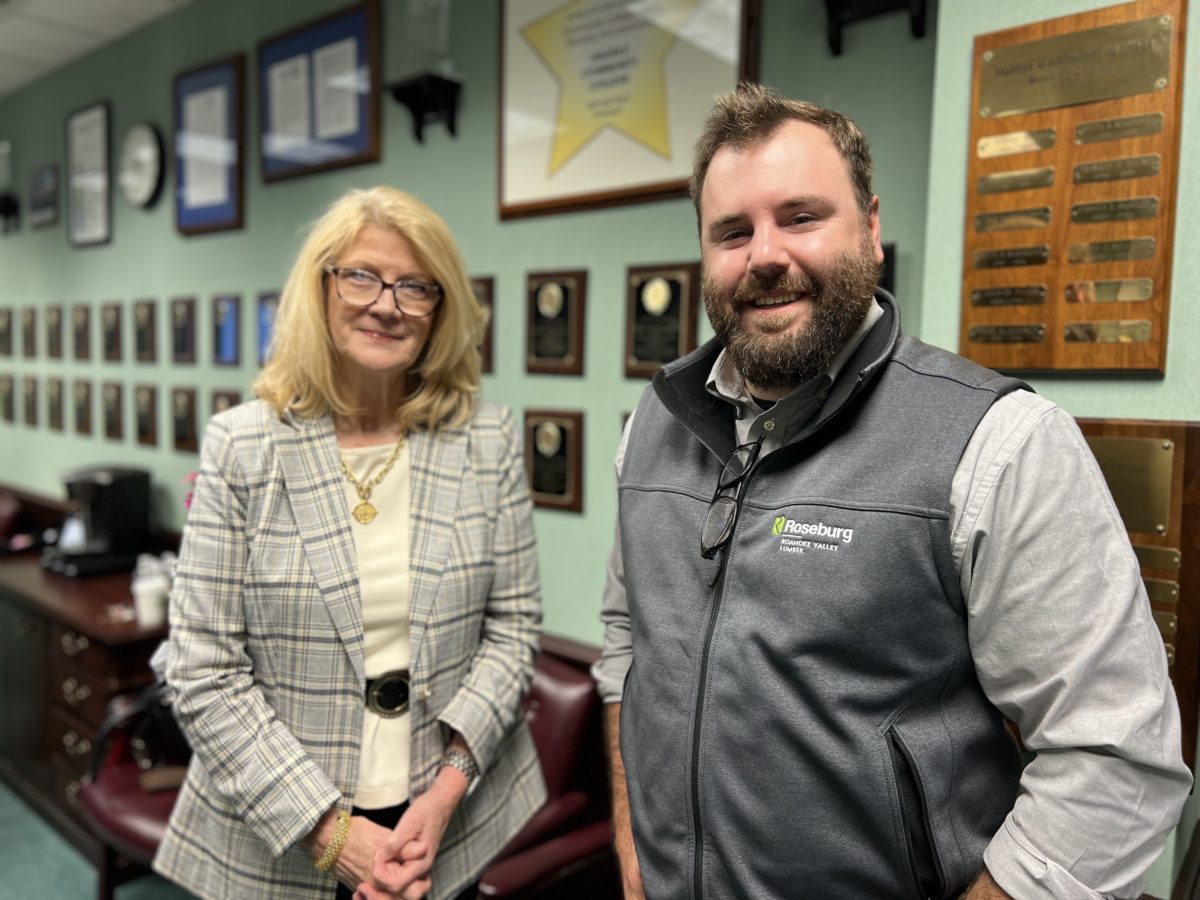
Share this story
- Here’s how @halifaxcc is training the next generation of forest manufacturing workers in North Carolina’s “wood basket” region. #nced #Impact58
- A new @RoseburgCo facility in Halifax County is “not our grandfather’s sawmill,” its manager says. New skills are needed to run it — and that’s where @halifaxcc has been essential. #nced #Impact58
|
|
Halifax is one of the state’s oldest counties, but adaptation is becoming a way of life there.
While its population has declined over the last several decades, falling 11% at the last census, the portrait of the region isn’t one of defeat. It’s one of spirit and fight. It’s one of a people who, like the Tuscarora who originally inhabited the land, look to its resources to prosper.
Three of the valuable resources the community is turning to now are its forests, its community college, and — especially — its people.
“I think one of the things that we noticed right away was how welcoming the community was,” said Adam Reed, who moved to Halifax County from Oregon last year to manage a plant that Roseburg Forest Products is opening. “We’ve had a very positive relationship with the folks that we’ve met. They’ve been very gracious and really wanted to help us.”
Roseburg is a forest products manufacturing company based in Oregon. The 90-year-old company has 15 locations – the Halifax site being the most recent.
It will create 137 jobs in the area, with room for growth. And the type of jobs is important. The average annual salary for these new positions is $50,796, well above the Halifax County average salary of $34,225.
“So in our efforts to support the location of higher-wage, higher-value jobs in our community, they’re a perfect example of that,” said Cathy Scott, executive director of Halifax County’s economic development commission.
Coveting forest, and the nearby community college
The state’s “wood basket” is in Eastern North Carolina, and Halifax County lies in its heart. Roseburg owns just under 200,000 acres of timberland in the region. But proximity to forest, alone, was not enough to attract Roseburg during what Scott called a very competitive process.
The driving factor, Reed said, was the proximity to Halifax Community College (HCC).
“Being in the industry that we’re in, which is manufacturing and, specifically forest products manufacturing, we’ve had a lot of folks that have retired out over the years,” he said. “So replenishing that workforce has been historically difficult. One of the things that we felt would be very beneficial to our business is our proximity to Halifax Community College.”
A recent study shows that Halifax Community College has a total annual economic impact on the area of $60.8 million. It supports nearly 1,400 jobs.
Sign up for Awake58, our newsletter on all things community college.
Roseburg’s relationship with HCC began under the leadership of the college’s late president Michael Elam, who passed away in January. The relationship has grown under acting president David Forester.
“We’ve had an opportunity to work with the team here, and they’ve been flexible with us in developing a curriculum that we think is going to help meet the needs of our new team members,” Reed said.
Modernizing manufacturing — and training
That curriculum includes manufacturing, but also accounting principles and advanced technical skills necessary to operate modern equipment.
“It’s not our grandfather’s sawmill, manually pulling lumber off the chain,” Reed said.
Historically, the sawmill business was a manual industry. But its workers now need the skills to run cranes that offload the logs. They will manage operator consoles that debark the logs, cut them to length, and break them down to lumber. Ultimately, machines will sort, stack, dry, and dress the wood.
“So it’s a little bit different skill set than we’ve targeted in the past,” Reed said, adding that Halifax Community College has been working with the company to develop a responsive program.
In fact, the college is already thinking about how to leverage its partnership with Roseburg and other forest manufacturing plants in the area. Once wood is harvested and treated, it needs to be transported. Adding a transportation program at the college, Forester says, would not only support this workforce, but would help residents take advantage of the county’s location along I-95.
Reed said the college’s eagerness to pivot and think outside the box was attractive to his company when it chose its location.
“Working with other educational systems in the past, sometimes it’s pretty rigid, you get what you get,” Reed said. “And with Halifax, it was really about how do we do what’s best for the folks that are in our community and that (are) coming through the program, and we’re willing to adapt and continue to grow together.”
‘Together’ is the key
Forester said the key to the partnership is the relationships that the college, the company, and the community are building with one another.
“The great thing about it is, Adam and about eight or nine colleagues have moved here from other locations, built homes in our communities, are living here, and becoming just really important members of our community,” Forester said.
For Reed, this is a community investment. The college is working with Roseburg to prepare the minds of future employees, but he said the people’s hearts were just as important to him.
“Oftentimes we look at, not just what people are doing, but how they do them,” Reed said. “So we try to hire folks that fit what we call an ideal team player model. Are they hungry; are they humble; are they smart? Are they caring for those around them in their community?”
So far, that’s what he sees across the Halifax area. When Reed and his wife relocated from Oregon, his first interactions were with the dozens of people who stopped by to welcome them and ask how they could help.
“It’s an incredible community,” he said.
Recommended reading




